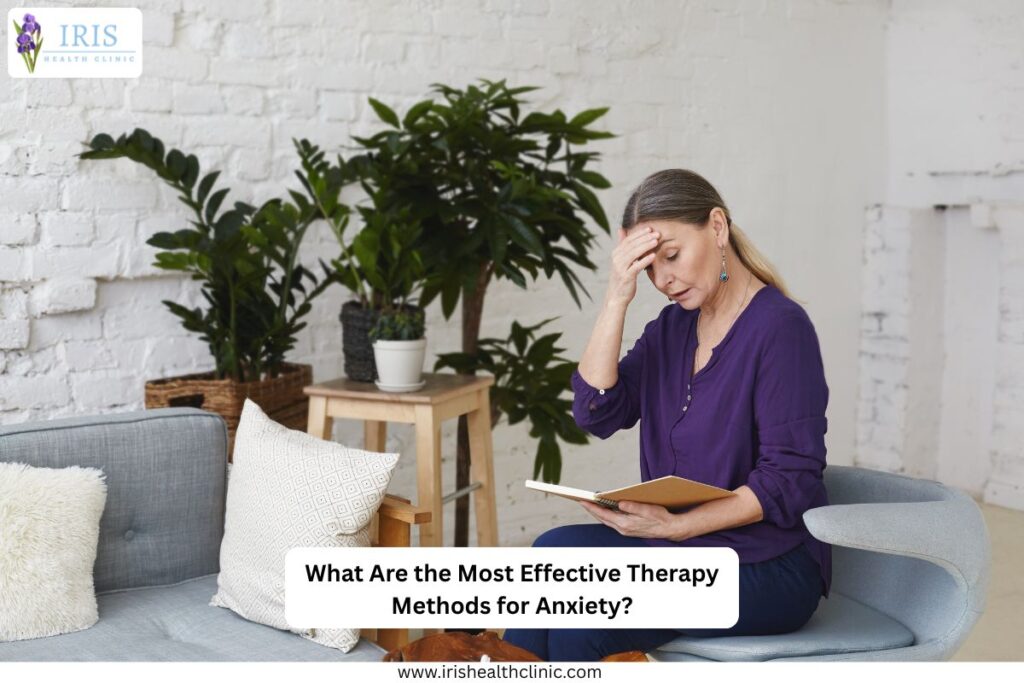Do you feel trapped in constant worry and stress? Anxiety can take over and make daily life exhausting. In this blog, we’ll share the most effective therapy methods for anxiety. You’ll see how they can help you.
From proven approaches like CBT and mindfulness to newer techniques, you’ll learn simple ways to feel calmer and more in control. You don’t have to let anxiety control your everyday.
With the correct method, you can regain balance and peace. We’ll guide you step by step, so you know where to start. Your journey to feeling better can begin today.
Why Therapy Is So Effective for Anxiety
Medication can play an important role in treatment, but therapy is often where real change begins. That’s because talking through your challenges, learning new coping tools, and practicing techniques in a safe space give you lifelong skills that help you break free from anxious patterns.
Therapy works by:
- Helping you understand the root causes of your anxiety
- Teaching specific coping strategies to manage symptoms
- Reducing physical and emotional responses to triggers
- Supporting you in developing healthier thought patterns and behaviors
What Types of Therapy Are Commonly Used to Treat Anxiety?
When it comes to therapy for anxiety, there are several methods that research has shown to be especially effective. Let’s explore some of the most commonly used approaches:
1. Cognitive Behavioral Therapy (CBT) for Anxiety
Cognitive Behavioral Therapy (CBT) is often the first-line treatment for anxiety. It helps you identify unhelpful thought patterns that fuel worry and teaches you how to replace them with more balanced, realistic thoughts.
CBT also equips you with practical tools you can use every day, such as breathing techniques, journaling, and problem-solving skills.
If you’ve been searching for cognitive behavioral therapy for anxiety in Wisconsin, you’ll be glad to know that CBT is one of the key treatments we offer at Iris Health Clinic.
2. Group Therapy for Anxiety and Depression
For many people, talking about anxiety one-on-one with a therapist is helpful, but group therapy for anxiety and depression can be especially powerful.
In a group setting, you realize you’re not alone, and that sense of community can reduce feelings of isolation.
During group sessions, you’ll share experiences, learn from others, and practice new coping skills together with people who genuinely understand what you’re going through.
3. EMDR Therapy for Anxiety
Eye Movement Desensitization and Reprocessing (EMDR) therapy was initially developed for trauma, but has been shown to be effective for anxiety as well.
EMDR uses bilateral stimulation, such as guided eye movements or gentle tapping, while revisiting stressful memories. Over time, this helps the brain “reprocess” how it stores those memories so they no longer trigger strong anxiety responses.
At Iris Health Clinic, many of our clients have found EMDR therapy for anxiety to be life-changing, especially if their anxiety is tied to past trauma or difficult life experiences.
4. Outpatient Anxiety Treatment
If your symptoms are significant but you’re not in need of 24/7 care, outpatient anxiety treatment can be a great option. Outpatient treatment allows you to receive therapy while still living at home and maintaining your daily responsibilities.
Our outpatient programs in Waukesha and Milwaukee include both individual and group therapy sessions, giving you the right balance of support and flexibility.
5. Combination Approaches & Holistic Methods
Sometimes the most effective path involves combining different kinds of therapy. For example, CBT can work alongside EMDR, or group therapy may be combined with individual counseling.

Is Group Therapy Helpful for Anxiety Disorders?
Yes, absolutely. Many people find group therapy to be one of the most healing parts of their treatment. Here’s why:
- Group settings help normalize your struggles, and you realize you’re not alone.
- You receive encouragement and support from others going through the same challenges.
- You can practice real-life communication and coping strategies in a safe space.
- The group dynamic often provides accountability and motivation.
When you join group therapy for anxiety and depression, you not only work on your own healing but also contribute to the growth of others, making it a truly empowering experience.
Can Therapy Completely Cure Anxiety?
This is one of the most common questions we hear, and the answer is: therapy may not always “cure” anxiety permanently, but it can dramatically reduce symptoms and give you powerful long-term tools to manage it.
Think of therapy as a way to “rewire” your brain and strengthen your emotional resilience. Even if anxiety symptoms come back from time to time, you’ll be well-equipped to respond effectively. Many people experience significant relief and go on to live happy, fulfilling lives after treatment.
Is There a Best Age to Start Therapy for Anxiety?
The truth is: there’s no “perfect” age to begin therapy. Anxiety can affect children, teenagers, adults, and seniors alike. What matters most is recognizing the symptoms and seeking help before they start interfering too much with your life.
- Children can benefit from therapy that teaches coping skills early.
- Teens and young adults often learn strategies that help them through stressful life transitions like school or career beginnings.
- Adults may seek therapy when anxiety is making it difficult to balance work, family, or personal responsibilities.
- Seniors may find therapy helpful for coping with health challenges, major life changes, or feelings of isolation.
Practical Everyday Tips to Manage Anxiety
Alongside therapy, there are practical steps you can take daily to keep your anxiety in check:
- Practice deep breathing or mindfulness meditation
- Keep a consistent sleep schedule
- Limit caffeine and alcohol intake
- Stay physically active
- Write your worries down and revisit them with perspective
- Stay connected with supportive family and friends
These tools, combined with professional therapy, make it possible to build a calmer, healthier life.
Why Choose Iris Health Clinic for Your Anxiety Treatment
At Iris Health Clinic in Waukesha and Milwaukee, we know how deeply anxiety can affect your everyday life, and we’re here to help you find freedom from it. Our programs are evidence-based, compassionate, and tailored to your unique needs.
Whether you’re interested in outpatient anxiety treatment, group therapy for anxiety and depression, or exploring cognitive behavioral therapy for anxiety or EMDR therapy for anxiety, we can guide you on your path to recovery.
To Sum Up
Anxiety doesn’t have to control your life. With the right therapy, you can learn healthy ways to cope, reduce symptoms, and discover a renewed sense of peace and confidence. Whether you’re considering CBT, group therapy, EMDR, or outpatient care, we encourage you to take the first step.
At Iris Health Clinic, we’re committed to walking this journey with you, from the very first appointment to celebrating your progress along the way.
Ready to take the first step toward a calmer, healthier future? Contact us today to learn more about our anxiety treatment programs in Waukesha and Milwaukee.

